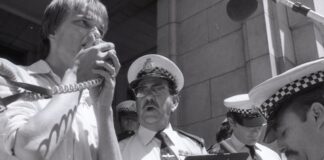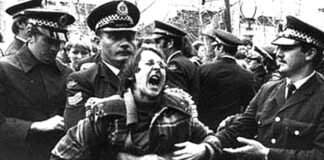At least 23 protesters were killed in Cairo last night, Sunday, as the army and police carried out a massacre in front of the state TV building, reports Hossam el-Hamalawy from Cairo
Coptic Christians had been staging a peaceful march from the working class district of Shubra to Maspero, in downtown Cairo, to denounce sectarian attacks against churches.
The international media has reported there were “clashes”—but the truth is the authorities cracked down brutally using live ammunition, while army armoured vehicles ran over protesters in cold blood.
The army also stormed the offices of two TV stations, taking them off air, to try to stop the broadcast of the videos of the attacks.
Egyptian state TV has been inciting sectarian strife, alleging Christians were armed and that they attacked the army. It also called on the “public” to take to the streets to “protect” the army. Thugs, armed with sticks and knives, attacked protesters, responding to the sectarian calls.
But the protesters were not exclusively Christian as the media tried to depict it. Many Muslims joined the clashes, and fought against the army and police. At one point a Muslim cleric carried a cross over the 6 October Bridge, leading Coptic protesters in marching on Maspero.
The demonstrators chanted repeatedly: “Muslims, Christians.. One hand!” and denounced Mubarak’s minister of defence, who is controlling the country now—Field Marshal Tantawi.
At the time of writing, the army has imposed a curfew from 2am to 7am in downtown Cairo. But more protests are expected.
Coptic Christians are discriminated against in Egypt, but they are also partners with Muslims in the fight against the regime. Two weeks before the revolution, Cairo and Alexandria swarmed with protesting Copts, denouncing sectarian attacks and calling for unity against Mubarak.
Later, many Christians defied the church and took part in the January uprising together with their Muslim brothers and sisters.
The current attacks on the Copts are an attempt by the ruling military generals to split the ranks of the Egyptian poor and pit them against one another. But the presence of Muslim protesters alongside Copts should be a hopeful sign.
Over the past month, more than half a million Egyptian teachers, doctors and public transport workers and others have struck, despite the anti-strike law which refers strikers to military tribunals. These struggles from below provide the strongest weapon to confront sectarianism.
From Socialist Worker UK





